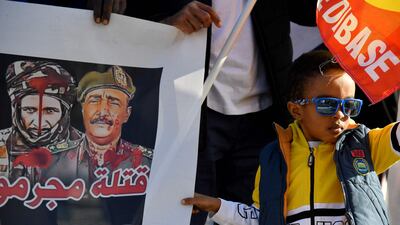A pro-democracy alliance in Sudan is calling for another campaign of civil disobedience on Sunday and Monday in a renewed bid to force the generals to restore the country’s transition to democratic rule.
The call by the Association of Sudanese Professionals follows the release from detention on Thursday of four Cabinet ministers. The released ministers are believed to be among at least eight Cabinet members arrested by the military shortly after army chief Gen Abdel Fattah Al Burhan announced the coup.
The call for civil disobedience would be the second since the October 25 coup. The first had paralysed life in the capital Khartoum for days and as it waned, life in Khartoum began to return to normal, with banks, some government offices and petrol stations reopening for business.
“We renew the call for a civil disobedience campaign on Sunday and Monday after we suspended it on the recommendation of some professional unions in view of well-known economic factors,” the Association of Professional Unions, the main force behind the street protests that forced the military to oust Al Bashir in 2019, said.
Meanwhile, ousted prime minister Abdalla Hamdok remains under house arrest. The military has also declared a state of emergency and suspended the work of a committee mandated with dismantling the legacy of ousted dictator Omar Al Bashir.
The military responded to last week’s wave of strikes by arresting some of the organisers.
It has also brought back from retirement senior managers to run key state facilities. Some of those are Al Bashir loyalists who had been fired over their close links to the toppled regime, pro-democracy activists claim.
The military has also arrested three senior members of the Forces of Freedom and Change, a pro-democracy alliance that had served as the powerbase or the political patron of Mr Hamdok’s government. They are Taha Osman Isahaq, Sharif Mohamed Osman and Hamza Farouk, all influential figures in the Forces of Freedom and Change.

The top UN representative in Sudan, Volker Perthes, strongly criticised the arrest of the three immediately after he met them in Khartoum.
“We call upon the military leadership to cease arresting politicians and activists and to stop committing further human rights violations,” Perthes said in a statement. “These arrests which took place after a meeting on our premises undermines our good office’s role.”
Separately, the UN High Commissioner for Human Rights, Michelle Bachelet, called on the military “to step back in order to allow the country to return to the path of progress towards institutional and legal reforms”.
She said those arrested since the coup included government ministers, members of political parties, lawyers, civil society activists, journalists, human rights defenders and protest leaders.
Resistance committees in residential neighbourhoods are voicing their opposition to contacts with the military and are vowing never to allow the generals a share of power. They are also demanding the leaders of the power-grab be put on trial.
The committees played a key role in the street protests against Al Bashir’s 29-year rule in 2018-19 and were instrumental in organising mass demonstrations against the latest takeover despite telephone and internet services being cut.
“We never were or will be a part of any group that advocates a settlement with the coupists,” said the association of resistance committees in Umm Durman, one of the capital’s three boroughs and a major hotbed of dissent. “There will be no negotiations or dialogue and no authority is above the will of the people.”
A senior member of the Forces of Freedom and Change, meanwhile, laid out some of the problems that lie ahead even if a settlement was reached.
Al Wathiq Al Berier, also general secretary of the large Umma Party, said a government that takes office as a result of the ongoing mediations would be beholden to the generals who allowed its creation.
There have been daily demonstrations calling for the military to step down and allow the transition process to resume.
The coup and the violence that followed have been met with strong international condemnations. The US and the World Bank suspended vital aid worth hundreds of millions of dollars in response to the coup.













